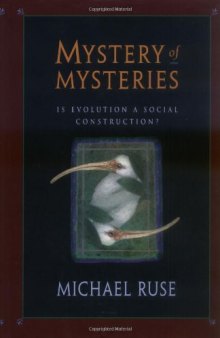دانلود کتاب Mystery of Mysteries : Is Evolution a Social Construction
by Michael Ruse|
|
عنوان فارسی: رمز و راز از اسرار: آیا تکامل یک ساخت اجتماعی |
 دانلود کتاب
دانلود کتاب
 جزییات کتاب
جزییات کتاب
Unfortunately, on a number of occasions Ruse forces a tenuous connection between scientific ideas and cultural background. As an example, he quotes Jack Sepkoski's disregard for his Christian educational background, "the Christian brothers had beaten religion out of me while trying to beat it into to me'" (p. 231), as evidence of his indifference to it in his work, but on the following page he notes that there is a very strong Herbert Spencer element of "states of dynamic equilibrium" (progress followed by a pause, followed by further progress) in his work, in spite of never having read of word of his: "... again we have reason to think that we have a culture-drenched vision, a neo-Spencerian one, rather than raw data" (p. 232), or "... or is Sepkoski (unconsciously) simply reflecting an American [Spencerian] tradition" (p. 233) . Why has Spenser left his mark on Sepkoski but not Christianity? Isn't there a progressive or teleological element in Christianity which could have left its "unconscious" mark on Sepkoski despite of his proclaimed "indifference"? If denying the role of one cultural influence, why not deny the role of both? On another occasion, Ruse mentions that Geoffrey Parker draws an analogy with painting in order to describe his approach to science, but Ruse then comments, "... this philosophy of science does not necessarily mean that Parker's values intrude into his science" (p. 211). Ruse tends to be selective about his examples and the lessons he draws from them.
This is a book that should be read with a very critical eye because Ruse occasionally oversimplifies and forces circular pegs into square holes in order to accommodate his theses. But it is also an approach with a pedantic purpose intended to show how one should assess what makes good science and accordingly how evolutionary science has progressed towards a high scientific standard. This approach does a good job highlighting similarities and differences - just remember it can be forced. In the end, Ruse argues that although Kuhn and Popper provide insight how science is practiced ("Both of our philosophers captured part of the overall picture" (p. 249)), it is the latter approach which should be the goal of science and is the "paradigm" of modern evolution. This book is packed with many interesting ideas from the post-Darwinian period, which is different from your typical history of evolution which focuses on the pre-Darwinian period. I rate this book 3.5 stars.




 درباره نویسنده
درباره نویسنده





 این کتاب رو مطالعه کردید؟ نظر شما چیست؟
این کتاب رو مطالعه کردید؟ نظر شما چیست؟
